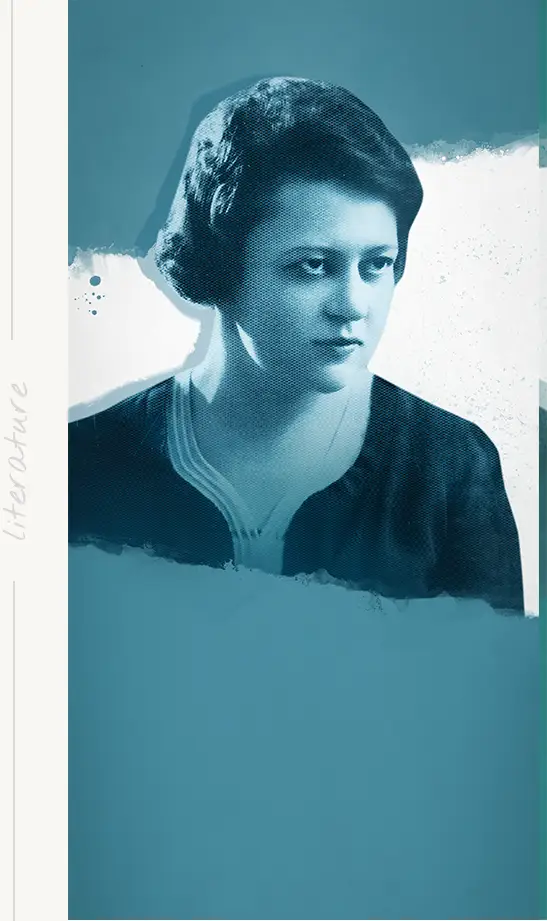
Debora Vogel
4 I 1900, Burshtyn (today’s Ukraine) — VIII 1942, Lviv Ghetto
Básnířka, literární a umělecká kritička, která psala především v polštině a v jidiš. Její experimentální tvorba představuje prolínání poezie a malířství.
Narodila se 4. ledna 1900 v malém haličském městečku Bursztyn (v dnešní Ukrajině). Za první světové války společně s rodinou emigrovala do Vídně, načež se přestěhovala do Lvova, kde poté strávila většinu života.
Autorka zpočátku psala německy, nicméně její debut byl vydán v polském jazyce. Přestože se u ní doma jazyk jidiš nepoužíval, Debora se v něm nakonec rozhodla psát a vydávat. Přesvědčila ji o tom Rachela Auerbach, spisovatelka a propagátorka moderní kultury jidiš. Debora publikovala polsky, hebrejsky a v jidiš. Ačkoli byla spojena s literárním prostředím, v němž se psalo v jidiš, přispívala rovněž do polsky psaných periodik. Publikovala eseje o poezii, umělecké recenze a své vlastní verše. Byla blízkou přítelkyní spisovatele a výtvarníka Bruna Schulze.
Její poezii charakterizuje experimentální duch. Její verše, které vznikaly hlavně ve 30. letech, se vyznačují radikalismem a minimalismem. Básnické experimenty autorky spočívaly v prolínání poezie a malířství, které sama nazývala „bílými slovy“. Vydala celkem dvě básnické sbírky: Tog-figurn (Denní postavy, 1930) a Manekinen (Manekýni, 1934), a také povídkovou sbírku „montáží” ve dvou jazykových verzích, v jidiš a v polštině: Akacjes blien (1935) a Akacje kwitną (Akáty kvetou, 1936).
V roce 1932 se Debora provdala za Šulima Barenblutha, lvovského architekta a inženýra; o čtyři roky později se jim narodil syn Anšel. Po nacistické okupaci Lvova byli členové celé její rodiny deportováni do místního ghetta, kde byli v roce 1942 během jeho likvidace zavražděni.
kreativita
kreativita
Poem on waiting (2)
translated into English by Anastasiya Lyubas
I have worn out
all my dresses
waiting for you.
I put them on the first time
took them off the last time
in a month of sticky sun, in a month of tired leaves
in the evening garden
a chestnut red dress,
ready to wrap me
soft as velvet.
The rust-gold dress
for the month of tired leaves
and bleak flowers’ second blossoms.
And a coral-colored dress,
in which I look like a cold coral
in the glass sea of afternoon streets
with a smell of the seaweed of bodies.
Never again
will I worry what dress to wear for you.
In: Blooming Spaces: The Collected Poetry, Prose, Critical Writing, and Letters of Debora Vogel,
translated, edited, and with an introduction by Anastasiya Lyubas, Boston 2020.
A poem of colors
translated into English by Anastasiya Lyubas
The white is flat:
a usual house seen from up front,
a boring house where nothing happens,
a flat paper rectangle, which wants nothing.
The gray is long and round.
You have nowhere to go, so similar are the houses.
And you go. Go impatiently along streets
until the street grayness gives out
and closes round the dwelling where you live.
The yellow elastic heat tin,
the tin yellow is deep.
Like the distance of things that do not return.
In: Blooming Spaces: The Collected Poetry, Prose, Critical Writing, and Letters of Debora Vogel,
translated, edited, and with an introduction by Anastasiya Lyubas, Boston 2020.
Ze zbiorów Muzeum Literatury im. Adama Mickiewicza w Warszawie
Dolls
translated into English by Anastasiya Lyubas
She stood for a long time
like a half act of porcelain
behind a milky windowpane
BARBER’S SHOP—BROAD STREET—15.
She was kneaded
from red porcelain dough
of women’s bodies by Rubens
and seduces with two pink breast-apples
as if with round shiny eyes.
With half-open eyes
the porcelain smiled
smooth and watery, as if enchanted
by everything which happens in the world
on the second, the other side of the window.
And on the other side of shop window
elastic dolls stroll
with sweet long almonds of eyes
and agile hands and feet.
Dolls with a movable heart
carry glassy pupils of eyes under eyelashes with mascara
and a carmine smile of Chameleon brand
and faces of smiling porcelain.
At the same time
pink dolls at fifteen Broad Street
show their lively breasts like round apples
and sadness like squandered happiness.
In: Blooming Spaces: The Collected Poetry, Prose, Critical Writing, and Letters of Debora Vogel,
translated, edited, and with an introduction by Anastasiya Lyubas, Boston 2020.
